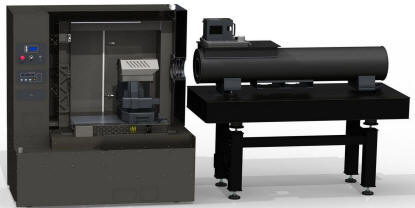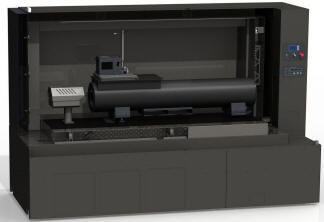Extreme conditions
In order to partially solve this problem, manufacturers of surveillance thermal imagers often carry out environmental tests of these imagers according to requirements of the popular MIL-810-STD military standard. The tests are typically done by subjecting the imager located in a temperature chamber to a set of extreme ambient temperatures for a prescribed time period and later checking if there is negligible performance deterioration due to the environmental tests comparing to performance tests before the environmental tests. However, results of such environmental tests according to MIL-810-STD standard give precise information only about the ability of EO system to survive a certain period of time at extreme ambient temperatures without substantial performance loss after the test is finished. These tests do not give information on real performance of tested EO system when working at extreme temperatures.
a) |
b) |
Fig.1. Cross section of a)EXIR-1, b)EXIR-2
Typical Inframet systems for testing EO imaging/laser
systems (DT, TVT, ST, MS and related systems) enable
testing thermal imagers, VIS-NIR cameras, SWIR imagers,
multi-sensor imaging/laser systems at
laboratory/depot/workshop conditions. It is typically
expected that work temperatures vary in range from about
+10C up to about +35C. Therefore tests using typical
Inframet test systems cannot deliver information on
performance of tested EO imaging/laser systems working
at extreme temperatures. In order to eliminate this
limitation Inframet can also deliver optional EX series
systems that enables testing EO imaging/laser systems
(thermal imagers, VIS-NIR cameras, SWIR imagers,
multi-sensor imaging/laser systems) at extreme
temperatures.
There are two main types of EX series
systems based on two different test concept:
EX-1:
tested EO system is located into special translucent
temperature chamber
EX-2: both tested EO system and
test system are located into typical temperature
chamber,
It means that:
1. Design of EX-1 system
is achieved by building special translucent temperature
chamber,
2. Design of EX-2 system is achieved by
conversion of typical laboratory class system into
special hardened version capable to work at temperature
chamber.
Both types of EX system are offered as
special customized product. Potential customer is
expected to deliver detail information on tested EO
imaging/laser systems.
Learn more:
In case of questions please contact us: info@inframet.com .
